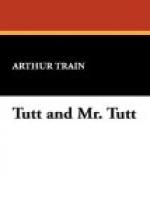“Law, Mis’ Tutt,” expostulated Miranda, his ancient negro handmaiden, as he pushed away the chop and mashed potato, and even his glass of claret, untasted, in his old-fashioned dining room on West Twenty-third Street, “you ain’t got no appetite at all! You’s sick, Mis’ Tutt.”
“No, no, Miranda!” he replied weakly. “I’m just getting old.”
“You’s mighty spry for an old man yit,” she protested. “You kin make dem lawyer men hop mighty high when you tries. Heh, heh! I reckon dey ain’t got nuffin’ on my Mistah Tutt!”
Upstairs in his library Mr. Tutt strode up and down before the empty grate, smoking stogy after stogy, trying to collect his thoughts and devise something to say upon the morrow, but all his ideas had flown. There wasn’t anything to say. Yet he swore Angelo should not be offered up as a victim upon the altar of unscrupulous ambition. The hours passed and the old banjo clock above the mantel wheezed eleven, twelve; then one, two. Still he paced up and down, up and down in a sort of trance. The air of the library, blue with the smoke of countless stogies, stifled and suffocated him. Moreover he discovered that he was hungry. He descended to the pantry and salvaged a piece of pie, then unchained the front door and stepped forth into the soft October night.
A full moon hung over the deserted streets of the sleeping city. In divers places, widely scattered, the twelve good and true men were snoring snugly in bed. To-morrow they would send Angelo to his death without a quiver. He shuddered, striding on, he knew not whither, into the night. His brain no longer worked. He had become a peripatetic automaton self-dedicated to nocturnal perambulation.
With his pockets bulging with stogies and one glowing like a headlight in advance of him he wandered in a sort of coma up Tenth Avenue, crossed to the Riverside Drive, mounted Morningside Heights, descended again through the rustling alleys of Central Park, and found himself at Fifth Avenue and Fifty-ninth Street just as the dawn was paling the electric lamps to a sickly yellow and the trees were casting strange unwonted shadows in the wrong direction. He was utterly exhausted. He looked eagerly for some place to sit down, but the doors of the hotels were dark and tightly closed and it was too cold to remain without moving in the open air.
Down Fifth Avenue he trudged, intending to go home and snatch a few hours’ sleep before court should open, but each block seemed miles in length. Presently he approached the cathedral, whose twin spires were tinted with reddish gold. The sky had become a bright blue. Suddenly all the street lamps went out. He told himself that he had never realized before the beauty of those two towers reaching up toward eternity, typifying man’s aspiration for the spiritual. He remembered having heard that a cathedral was never closed, and looking toward the door he perceived that it was open. With utmost




